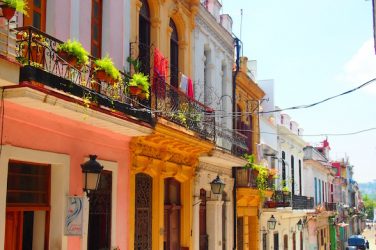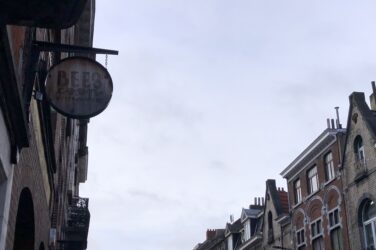In 2018, Nils (26) and Alex (24) launched their very own startup – SocialBnB. While travelling, they had realized the potential that conscious tourism has: instead of merely benefiting from local givens, travelers could actually contribute during their stay, so their vision went. 2 years and a pandemic later, E&M had the pleasure to interview them about their experiences, troubles and dreams.
E&M: Let’s start with the basics: could you tell us in one sentence, what the purpose of SocialBnB is? What made you start the business?
We want to to promote a tourism where everyone benefits, from the local population to the travel to the local economy.
E&M: Closely connected, who do you see as your main target group? How are you trying to get them on board?
Our main target group are 18-30 year old backpackers. People who are looking for a local and authentic travel experience, connecting with locals wherever they go. Our travelers want to support the communities they are visiting with their stay. We also received great feedback from families willing to travel socially responsible.
E&M: Since you’ve started, what would you say were the most important milestones in your path to success? And what do you even define as success?
To us, success means building a social business that benefits everyone. Not just the travelers and the aid organizations, which we focus on in every decision we take, what would be in their best interest, but also having a great team and a place that people like to work at. To us, success is every single booking we have, because we know what it means to our partners and what every single overnight stay can do for them.
The milestones have been to start the company to take the step from being a student-run, part-time project to going full-time social start-up and commit yourself to it. Furthermore, some milestones were:
- The first booking
- Hear the positive feedback from travelers and aid-organizations
- Win our first start-up competition to see that also other people see the potential
- Our first employees, to realize that other people not just the founders can develop a deep commitment and connection towards Socialbnb
E&M: What are the main things you’ve learned during your work at a start-up?
Deal with setbacks and find solutions every day: There have been so many things that didn’t go according to plan or that made us take a step back, but we’ve always learned and improved upon.
Find solutions everyday and grow every day, there are few things that can’t be learned or that others can’t help you with.
Share your idea, collaborate with others and support others.
Plus, there are many things you don’t learn at university that you need.
E&M: The typical dilemma of start-up work is that on the one hand, you get to decide a lot and have a lot of power, but on the other hand, there can also be quite a lot of chaos, uncertainty and risk. Would you say this is the experience you’ve had, too?
Definitely, no one takes care of the chaos unless you do. That’s different from big corporations. There is always someone who can take care of the mess or do your job. In a start-up you need to create the organization yourself. You need to build a team, you need to find ways how they can work together, share their ideas and how it can be monitored.
However, with a good team and engaged people it is also very rewarding to solve these issues. We ask every team member to contribute to the idea of Socialbnb. To come up with better ways to work together, to better support the aid-organizations and I’m quite sure that this responsibility is something our team really likes.
E&M: Did you have any prejudices beforehand that turned out to be completely false?
The competition with other start-ups. I was little concerned to share our idea but it turns out start-ups are very very supportive to each other. Everyone is aware that they are working in an uncertain and risky business as a start-up, so we share our ideas, experience and knowledge with each other.
E&M: Let’s talk about some potential issues. We imagine that most people using your services have a somewhat similar mindset – rather cosmopolitan, quite reflective, and considerate. Have you had bad experiences with people disrespecting locals or the environment in their travel destinations?
Luckily, not yet. We had very nice travelers so far, respecting the local customs and enjoying their experience. The people that book us are very considerate that we are a start-up and the places they sleep at are not necessarily super professional hotels, so they are very nice with us.
But we know that this will not be like this forever as we keep on growing. We develop traveler and host guidelines along with an elaborate system to screen our aid-organizations before the listing, to make sure everyone involved has a pleasant and enriching experience.
We are always there for concerns or ideas for improvement from both sides and by receiving feedback from both travelers and hosts we make sure that we keep improving and listen to their concerns. This way we also make sure that unpleasant experiences will not happen again.
E&M: This is an obvious question. What has the advent of Corona meant for your business?
Corona hit us hard in the beginning of the year, we just started the company and wanted to expand. We stopped all bookings and cancelled the ones remaining to protect our organizations and our travelers.
We used the time wisely and worked on many different things that needed our attention. Like for example, improving our onboarding process including the NGO criteria we have. As well as working on expanding our network of partner NGOs. We have almost double our partners since Corona and want to grow even more to help these organizations to recover faster when the Corona impacts decrease. At the same time, we make sure that for the travelers we offer more destinations and a great variety of projects they can support with their overnight stay.
E&M: What strategies are you using to adapt to the problems tourism as an industry is facing?
We want to do our part in reshaping the tourism industry and we think this is a great opportunity to do so.
Before Corona, mass tourism was a big problem and the local population benefitted way too little from the positive effects tourism can have on the region. We see a new way of traveling as a great opportunity to help everyone benefit from it. Keep the money that is spend for traveling in the region that is being visited and let the local communities benefit from it. We do this by using NGO as a multiplier. They know the local issues and solve them for their local community or the local environment.
We hope when tourism restarts this will be the way to go forward. A more local and authentic tourism, that benefits the many and not the few. While enabling the traveler to have more meaningful travel experience and enhance the intercultural understanding.
E&M: Now finally, could you briefly tell us a story about a moment in the past when you thought: seeing this working out is exactly what I’m getting up for in the morning?
Hearing that our teams likes what they are doing and see that they develop the same passion as we founders did. Speaking to organizations and hearing that they love our concept and this could really make a difference to them.










